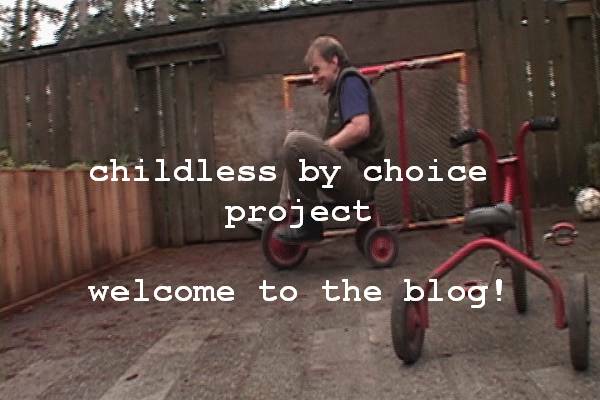Amy and Lance Blackstone are a childfree couple with a new website and blog called
We are {not} having a Baby. I chatted with Amy and we thought it would be cool to guest blog on each other's sites. Amy's husband Lance offerred to give his perspective as a childfree guy who came from the assumption of parenthood. In the Childless by Choice Project I made a real effort to include men because they are often overlooked in the discussion of voluntary childessness, but not here, not now. Here's Lance's story:
Growing up I knew that I’d have kids of my own. The path was obvious: grow up, date, get married, have kids and be a dad. Preferably in that order. No steps optional.
This is how it works.
I’ve occasionally been wrong, but for the sake of this post I'll assume that many guys have a similar mindset.
I first actively questioned the obvious path around nine when I realized kids are a LOT of work. I have first hand experience of this. You see I have four siblings, all older sisters. Yes, four older sisters; thanks for the sympathy.
At that point two (only two!) of my sisters still lived at home with yours truly. We were an absolute handful, or more truthfully, I was an angel with two wicked, older step sisters.
I kid, I kid! Love you, my actual real, not step, sisters!
Where was I? Yeah, well, I watched mom and dad try to deal with angry, petulant, self-centered tweens and teens with endless needs and demands for time, food, money, laundry, etc. I thought to myself “Why would you do this to yourself?"
Yes, I know. Wise beyond his years, you say.
Speaking of, I’ve always been a pretty logical thinker (he says about himself). Illogically, I often assume others to be the same. Logically/illogically I figured I must be missing something. People put themselves through so much effort and heartache while giving up so much freedom, and time, ergo there must be more to the story...
I chalked it up to not understanding; to being young. I sez to myself "When I'm more mature I'll get it, and when I get it, then I'll want kids”.
Because this is how it works.
Time rolled on. I grew up (arguably). I dated. I got married. It never happened though. I’ve never wanted kids. And it's not because I never saw an upside - I do see how meaningful kids can be to parents that really want them. No, I've never wanted kids because I clearly see the downsides and for me the cons outweigh the pros.
Now I’m in my early 40’s. I’ve been married for 18 years. I love my life as it is, childfree. Speaking of, as I write this, my wife and I are on our way to a tropical island for the next 5 weeks where we will host friends and family. You think we could pull this off if we had kids?
For me, this is how it really works.














